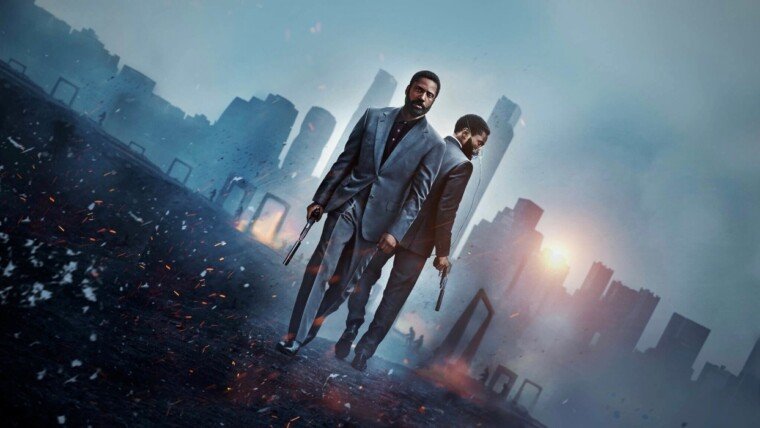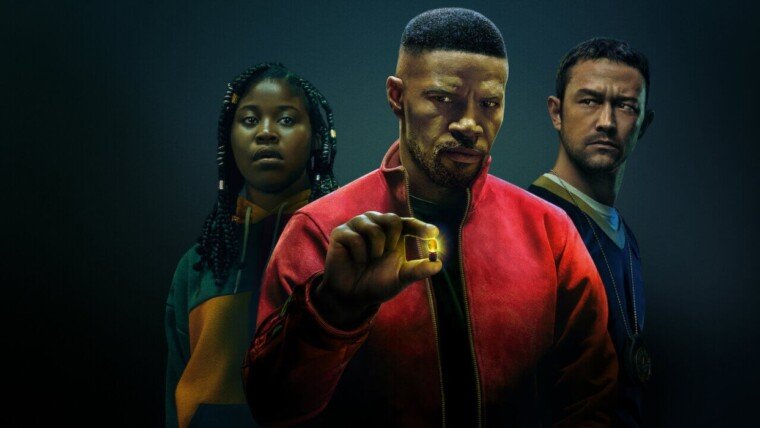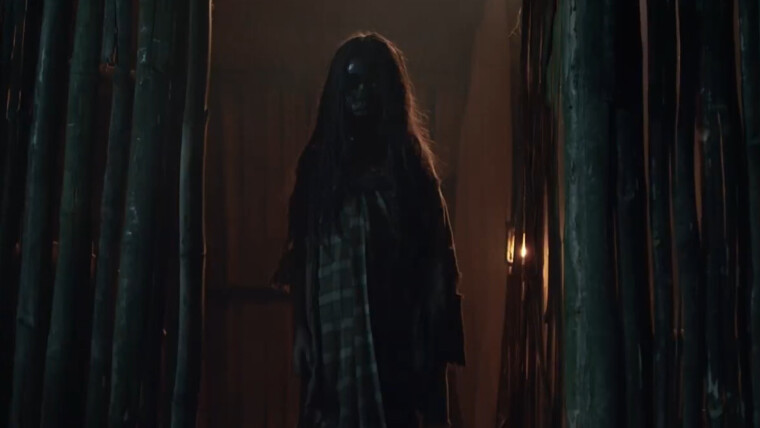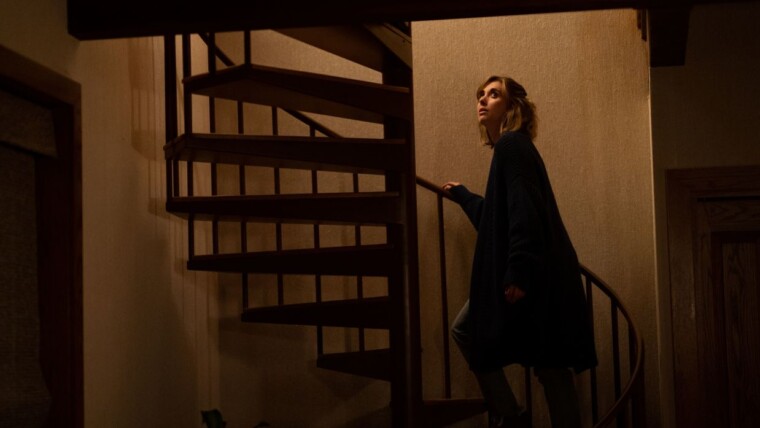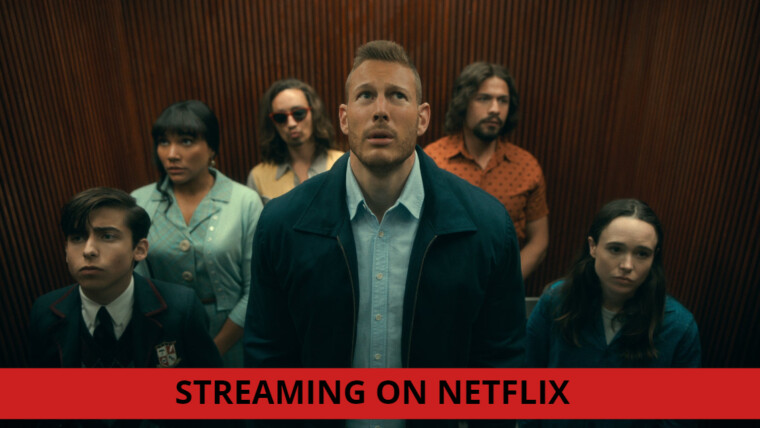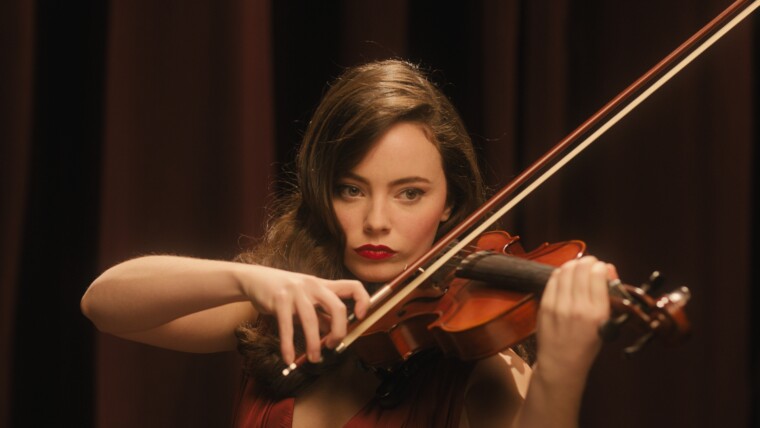Picture this. Vijay Sethupathi’s character Ram and Trisha’s character Janu meet each other after two decades (they’re a part of the graduating class of 1996, hence the title) at their high school reunion. Janu asks Ram why he isn’t married yet after all these years. He remains silent. She asks again, this time a little more heatedly. We know what’s going to happen next. Ram will yell, “Because of YOU!” as the camera cuts to Janu’s face, now overcome with shock, eyes filled with tears, accompanied by the sound of thunder and lightning. Right? Wrong. C. Prem Kumar’s 96 is not that kind of movie (for the most part, at least).
Here, Janu tells Ram, “dude, can you just tell me? I don’t mind, even if it’s because of me.” In another scene, Janu jokingly asks Ram if he’s still a virgin. I cracked a smile. It reminded me of the condom joke in Gautham Menon’s Yennai Arindhaal, starring Ajith. What would rural India make of such a bit, especially one directed at their Makkal Selvan? I wondered.
Ram is a travel photographer. (He also teaches photography during his spare time.) But ‘photographer’ isn’t just a roll-of-the-dice profession assigned to the character. It’s a symbol. Early on in the film, Ram tells one of his students, “Photographs have the ability to freeze time.” And Ram, just like the pictures he takes, is frozen in time. When Ram passes by his hometown, he lights up. You can see it in his eyes, the memories start to trickle in, as he excitedly tells his driver (his student) about the various landmarks in his neighbourhood — “there, behind that temple. That’s where I used to live.” But he also tells her not to stop — “If someone recognises me, I’ll have to talk.” That is until he sees his high school security guard (a neat little cameo by Janagaraj), still seated in front of his old school. And then… the memories start flooding in.
There’s something captivating about watching Ram walk around his old school, quietly, occasionally breaking a smile. Just looking around. In silence. I wondered what it’d be like if I walked through the gates of my primary school (I only left high school 6/7 years ago) again. Would there still be a patch of sand in the football field, where there should’ve been grass? I love the scenes where Ram makes a phone call to one of his old buddies, who then adds him into a dormant Whatsapp group, which eventually, after some quirky back and forth banter in the group, leads to the class of ’96 reunion. I also like how Prem Kumar sneaked in a little line for the Vijay Sethupathi fans. In the Whatsapp group, one of the classmates says, “wow! None of you were this excited when I was added to the group. I guess a comedian will always be a comedian and a hero will always be a hero.”
During the reunion, when one of the Ram’s friends mentions the name “Janu”, we get a flashback sequence. But the film doesn’t just cut to it. The camera steadily zooms in on Ram’s face. The shot, as pretty as it is, is more than just aesthetic. It captures a mood. Even the sound is drained out. In that very moment, Ram feels like he’s the only person in the world. Nothing else matters. Director Prem Kumar holds our hands and leads us into the flashback gracefully. (Later, we get another similar sequence. This time, we zoom in on Janu, in an equally effective shot.)
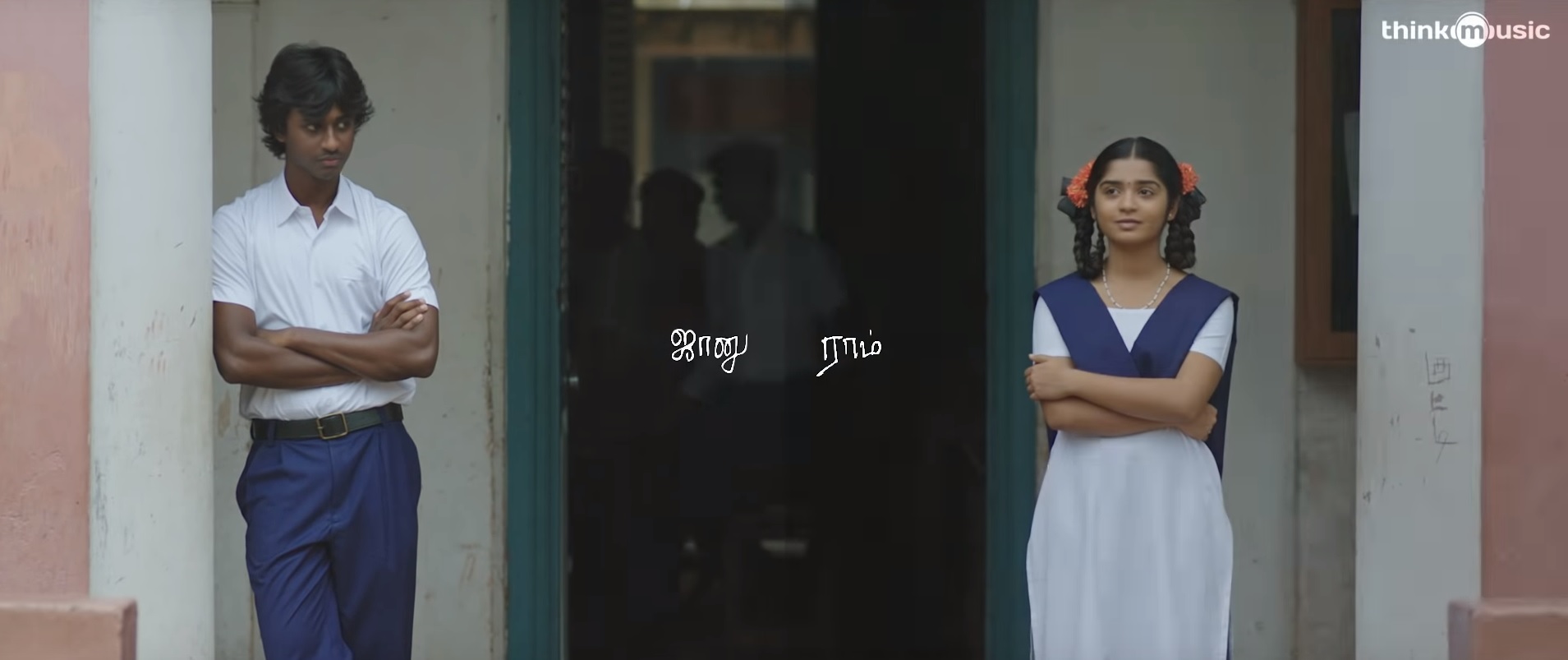
The flashback is where the film truly comes to life. It features Adithya Bhaskar and Gouri Kishan as the young Ram and Janu, and details their teen love. There’s also a bunch of other teen actors who mirror their adult counterparts — Visaranai Murugadass, Devadarshini, etc. Prem Kumar does a stellar job capturing the essence of innocent puppy love (we, as adults call it that. But at that point in time, to those 17-year-olds, their love was as valid and passionate as Napoleon and Josephine’s), so much so that I wasn’t the least bit eager to get back to the present day adult story. It helps that both Adithya and Gouri are so charming and comfortable in their roles.
I’m glad that there isn’t a scene where young-Ram’s friend asks him why he’s in love with Janu. There is no ‘why’. They’re teens who find each other attractive. He likes the way she sings. She likes the way he looks at her. I don’t know. Does it matter? Prem Kumar takes the conventional love story dynamic and flips it on its head, making the characters interesting. Ram isn’t the macho guy who chases after her and sweeps her off her feet. He acts tough, sure, and has an athletic build. When she’s absent from school for a couple of days, Ram gets worried (and a little furious too). He rides his bicycle around her neighbourhood looking for her house. But in her presence, Ram is as functional as a mannequin in H&M. He’s nervous, unable to utter a single word. When she touches him, his heart pounds so fast, he blacks out. Janu finds it funny. Ram’s close friends think he’s an idiot. Janu, the more confident and outspoken of the both, ends up doing most of the talking and the wooing. These scenes are cheesy, sure. But don’t mistake cheesy for cringy. There isn’t a single beat overplayed or out of place. It feels authentic. Teen love is supposed to be idealistic and cheesy.

So, why then does Prem Kumar, who had us dancing in the palm of his hands throughout the entirety of the first half suddenly lose control in the second? 96 becomes considerably less engaging when it switches back to adult Ram and Janu, especially after the interval. There are some brilliantly written, directed and performed moments. The scene where Ram turns around and sees Janu standing there comes to mind. It’s been 20 years. He’s at a loss for words, just like he was when he was 17. Or the one where Ram and Janu are seated at the table alone, not knowing what to say to each other or how to even start? How would you start a conversation with someone you once loved dearly — whom you still have feelings for — especially since your first chapter didn’t end with a period but a fade. Janu and Ram opt to watch each other eat, in silence.
But somewhere during his writing process, Prem Kumar decided that this film needed an injection of melodrama and cheap theatricality. And so, there are many instances where he substitutes silence with loud melancholy music and our co-leads (Vijay Sethupathi and Trisha’s name appear together in the opening credits) walking in slow motion. He also switches nervous energy and awkwardness for big bursts of emotions that feel jarring, unearned and Oscar bait-y, as they call it in Hollywood.
Take the scene where Janu finds out that once upon a time, Ram actually came looking for her at her college, but because of a (ridiculously elaborate, plot convenient) mixup, Ram leaves under the impression that Janu dislikes him. Setting aside the needlessness of the scene in the first place, what bothers me more is the way Janu reacts to this new information. Instead of just sinking into her chair, processing what she just heard and thinking of what could’ve been as an uncomfortable air swallows the car, she bursts out crying, not before walking away in… you guessed it… slow motion. It’s a shame, because the second half, just like the first, is built on a solid foundation. Its concept — our lives that were versus our lives that are — is great. But unlike the first half, the storytelling lacks purpose or conviction. The writing is mundane with a lack of snappy and engaging dialogue. I’m not looking for an emotional hook, but there needs to be a sense of rhythm and momentum.
Towards the end of the film, Ram asks Janu if she’s happy with her life right now. Janu says she’s peaceful. This is a great exchange that contrasts the idea of ‘idealistic teenage relationships’ with the more ‘logical and cynical adult perspectives’. But it’s just one line. The film could’ve benefited from more deeper explorations of these mature concepts. Not just in terms of what the characters say to each other, but how they react with one another. 96 should’ve ridden the fine line between restraint and explosion. And our characters should’ve worn this fine line on their faces and their bodies — “we want to hold hands, but we shouldn’t,” “we long to have sex, but we mustn’t.” And while the tension boils and spills out of the screen, our characters reminiscent, talk about the life that could’ve been and then… they bid goodbye and move on with their lives.

It’s all there in concept, but not fleshed out in writing. I feel Prem Kumar wanted to us to root for their relationship on an emotional level, but understand why it can’t happen on a logical level. But that goal isn’t achieved because there are a lot of instances where he opts for the simpler melodramatic route. I wonder if while penning the script he felt the need to pander to the mass audience, the audience that would connect better (I’m assuming) to simpler beats and basic expressions of emotions.
But for all the issues I have with 96, I’m glad the film even exists. I’m glad we don’t have to wait for a Mani Ratnam or a Gautham Menon to give us smaller, more mature masala outings. I’m glad the new generation of directors are changing the landscape of Tamil cinema. More than anything else, I’m glad that big stars like Vijay Sethupathi (both he and Trisha act their heart out here and have good chemistry too) are willing to put the movie star aside and just be plain ol’ actors.
If you’d like to talk movies with me you can hit me up on Twitter here: @dashtalksmovies


